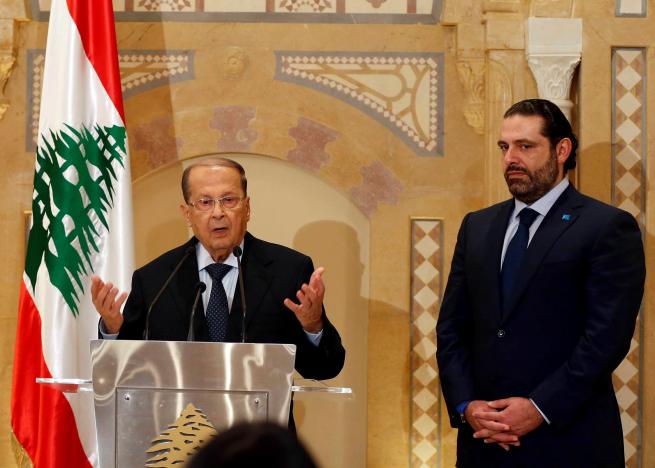In Lebanon deal, Iran wins and Saudi retreats
By Tom Perry and Laila Bassam/Reuters/October 26/16
A veteran Christian leader is set to fill Lebanon’s long-vacant presidency in a deal that underlines the ascendancy of the Iranian-backed Hezbollah movement and the diminished role of Saudi Arabia in the country.
It appears all but certain that Michel Aoun will become president next week under an unlikely proposal tabled by Sunni leader Saad al-Hariri, whose Saudi-backed coalition opposed Hezbollah for years.
Parliament will likely elect Aoun on Oct. 31. This will end one element of a paralyzing political crisis: the 29-month-long presidential vacuum. But it is also creating new tensions that may disrupt the formation of a new government expected to be led by Hariri under a deal with Aoun.
Aoun’s election will also raise questions over Western policy toward Lebanon. Lebanon’s army, guarantor of the country’s internal peace, depends on aid from the United States, which deems Hezbollah a terrorist group.
Hariri’s proposal, unthinkable a few weeks ago, appears to have been forced on him by problems at his Saudi-based construction firm, Saudi Oger, the financial backbone of his political network in Lebanon.
It marks the death throes of the Hariri-led alliance that struggled with Hezbollah for more than a decade, only to see the heavily armed Shi’ite group go from strength to strength in Lebanon and the wider region.
With Hezbollah seemingly unassailable, Lebanon has tumbled down Saudi Arabia’s list of regional priorities as it focuses on confronting Iran in Yemen, Bahrain and Syria, where Hezbollah is fighting in support of President Bashar al-Assad.
That has led Riyadh’s allies in Lebanon to cut new deals to preserve their interests.
“Lebanon is no longer a priority for the kingdom of Saudi Arabia, and Saudi Arabia no longer backs its allies in Lebanon, which has led to the weakening of its main ally in Lebanon – Prime Minister Hariri,” said Nabil Boumonsef, a political commentator in the Lebanese newspaper an-Nahar.
Announcing his endorsement of Aoun last week in a televised speech, Hariri said he was acting to protect Lebanon.
But acceptance of Hezbollah’s candidate is being seen as a defeat for the Hariri camp. “There is a victor and a vanquished, this is something that always brings dangerous consequences in Lebanon,” Boumonsef said. “We are facing a breakthrough with the election of a president, but a minefield the day after.”
Aoun, who is in his 80s, is unlikely to secure the presidency in a first round vote on Monday that requires him to win a two-thirds majority in the 128 seat parliament. But barring surprises, analysts expect him to secure the simple majority needed to win a second vote to be held the same day.
A “HAPPY ENDING”?
The Lebanese presidency, reserved for a Maronite Christian in the country’s sectarian power-sharing arrangement, has been empty since Michel Suleiman’s term ended in May, 2014, pending a deal on who should succeed him.
Aoun, army commander during Lebanon’s 1975-90 civil war, has long coveted the position his supporters deem rightfully his.
He led one of two rival administrations in the final years of the civil war, and was driven from the presidential palace and into exile by Syrian forces in 1990. He returned only after Syria withdrew from Lebanon in 2005 under international pressure following the assassination of Rafik al-Hariri, Saad’s father.
Aoun has been a staunch ally of Hezbollah since declaring their alliance in 2006, surprising many. Hezbollah and its allies toppled the first Hariri-led cabinet in 2011, quitting while he was meeting President Barack Obama in Washington.
Explaining his decision to endorse Aoun, Hariri said they had agreed common principles, including strengthening the state. Aoun met Hezbollah leader Sayyed Hassan Nasrallah on Sunday to thank him for the “happy ending” to the presidential crisis.
But analysts say Aoun and Hariri, 46, face a formidable task to win the cross-party support needed to make a new administration a success.
Parliament Speaker Nabih Berri, head of the Shi’ite Amal Movement and a long-time opponent of Aoun’s, strongly criticized his deal with Hariri, angry they did not consult more widely.
Berri, a close ally of Hezbollah, has said it could take five to six months to form the government, meaning it may not take office before parliamentary elections expected next year.
“There is quite a serious risk that Saad al-Hariri either fails to form a government or that it takes a long time,” said a diplomat, speaking on condition of anonymity.
That would add to the political damage Hariri has suffered.
His Sunni critics say he has already compromised too much with Hezbollah, five of whose members have been charged by a U.N.-backed tribunal over his father’s killing.
Hezbollah denies any role.
Hariri’s Future Movement faces a growing challenge from a former ally, Ashraf Rifi, who has cast himself as an uncompromising opponent of Hezbollah. Some Future MPs have said they will not vote for Aoun.
QUESTIONS OVER MILITARY SUPPORT
Aoun’s swearing-in will be closely watched for his position on divisive issues including the powerful arsenal wielded by Hezbollah outside of the state’s control, and Lebanon’s stance towards the war in Syria. The state has adopted a policy of official neutrality, even as Hezbollah fights in Syria.
The diplomat said the West would be paying close attention to whether Aoun acts in the national interest given his alliance with Hezbollah, and whether he tries to install loyalists in critical institutions such as the central bank and military.
The Lebanese army is the world’s fifth largest recipient of U.S. military aid. That support has become even more significant since Saudi Arabia canceled a $3 billion in aid to the army and security forces in February, angered at the government’s failure to condemn attacks on Saudi diplomatic missions in Iran.
“If the army starts to look like an Aoun fiefdom it becomes harder for Western donors to maintain support for the Lebanese Armed Forces,” the diplomat said.
(Writing by Tom Perry; editing by Giles Elgood)



















